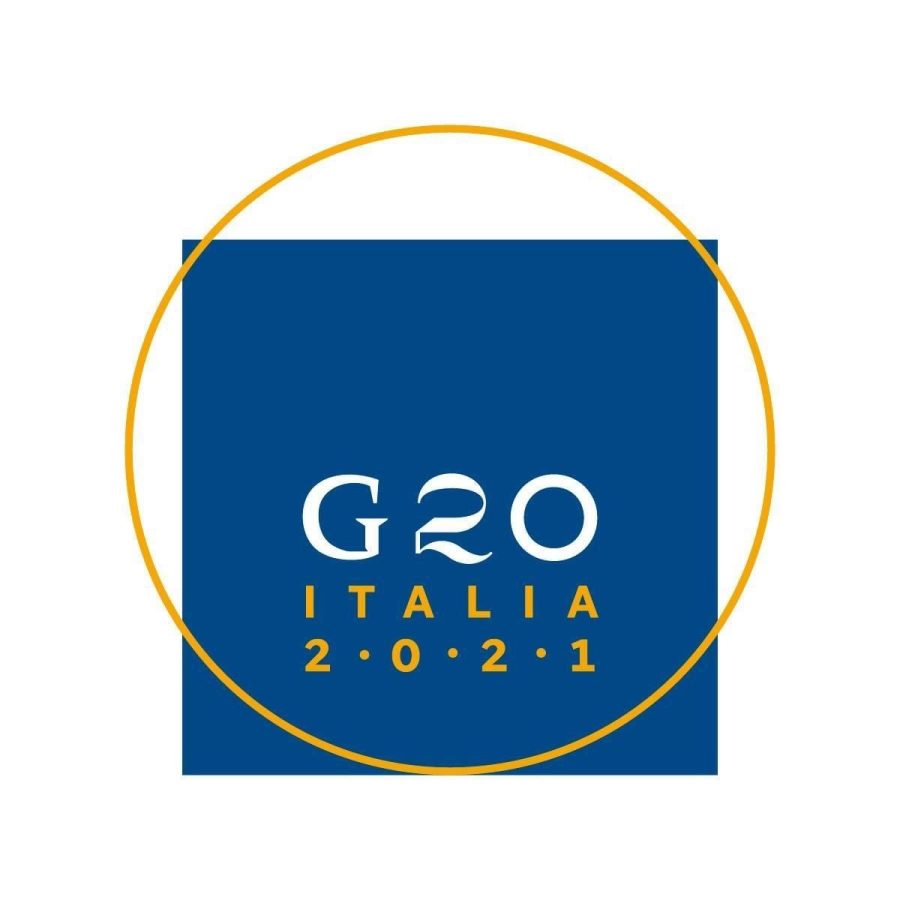Global Diplomacy– the G20 Summit and COP26 Conference
This year’s G20 summit logo evokes Leonardo da Vinci’s “The Vitruvian Man” and pays homage to Humanism.
November 12, 2021
In the last days of October, 20 of the world’s most prominent leaders met to discuss the global economy post pandemic. The G20 Summit is self-described as “an international forum bringing together the world’s major economies.” Attending countries are home to the world’s largest economies, making up more than 80% of the global GDP, 75% of global trade, and 70% of the world population. The group has held yearly meetings since 2008, becoming symbolic of multilateral cooperation.
This year’s attendants include G20 members Argentina, Australia, Brazil, Canada, China, France, Germany, Japan, India, Indonesia, Italy, Mexico, Russia, South Africa, Saudi Arabia, South Korea, Turkey, the United Kingdom, the United States, and the European Union. Presidencies are able to invite guest countries. Conferences are hosted by rotating Presidencies and organized by the Troika or the partnership between the current Presidency, its predecessor, and its successor. The current Presidency, Italy, set forth their priorities as “people, planet, prosperity.” The priorities reflect the intent to address climate change, equity in the global economic recovery, post-pandemic, and global crisis resiliency.
The United Nations Secretary General, António Guterres, set the tone for the following days of meetings. In his address, Secretary General Guterres, urged leaders to fulfill their climate commitments describing inaction as, “condemn[ing] the world calamitous 2.7 degree celsius.”
The conference facilitated various discussions between world leaders that pertained to a multitude of topics. Oct. 30th, meetings about relations and policy with Ukraine, China, and President Biden also met with Chancellor Merkel to discuss Afghanistan, and continued relations as power transitions from her to Olaf Scholz. The escalating Iran nuclear situation was also addressed by leaders from France, Germany, the U.S. and the U.K., urging Iranian leaders against actions toward nuclear escalation. This was followed by the announcement that multilateral talks addressing this will resume at the end of November. One of the largest agreements, among all 20 countries, was the establishment of a global minimum tax.
Notably, Chinese President Xi Jinping and Russian President Vladimir Putin chose to attend virtually. Choosing to physically abstain from the conference has received global skepticism. U.S. president Joe Biden commented on President Xi’s absence as a “big mistake,” and claimed “[China has] lost an ability to influence people around the world.”
Following the G20 summit is the United Nations (U.N.) COP 26 or 26th session of the Conference of Parties. Held in Glasgow, the yearly conference meets to discuss climate change action. It often serves as a reminder to world leaders of the agreed upon goals made in the Paris Climate Agreement. Many agreed upon targets for 2025 and 2030 will not be reached, discouraging faith in leaders’ actions and enraging climate activists. Environmental activists gathered in Glasgow, calling out world leaders. Swedish activist, Greta Thunberg said,“we cannot solve a crisis with the same methods that got us into it in the first place…We need immediate drastic annual emission cuts unlike anything the world has ever seen.”
While these conferences opened important conversations about global problems, the work to implement said action has yet to happen. This responsibility falls on world leaders to implement legislation which would follow through with their commitments. It will be interesting to see how these commitments will play out in the years to follow.


